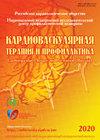Cardiovascular complications in non-cardiac surgery: what remains out of sight?
Q3 Social Sciences
引用次数: 0
Abstract
Aim. To evaluate any cardiovascular abnormalities in the postoperative period, their prevalence and impact on the course of postoperative period in patients after non-cardiac surgery, which underwent postoperative examinations of cardiovascular system.Material and methods. The study included 2937 patients. The assessed end points were postoperative cardiovascular events (CVEs). Along with major adverse cardiovascular events (MACE), we analyzed any cardiovascular abnormalities in the postoperative period as follows: electrocardiographic ST-T abnormalities, acute or decompensated heart failure (HF), arrhythmias, episodes of hypotension or hypertension, bleeding, thromboembolic events (TEEs), cerebrovascular events, postoperative delirium. Any CVEs constituted the any cardiovascular events' (ACVEs) group. Statistical analysis was carried out using the StatTech v program. 3.1.6 (OOO Stattekh, Russia).Results. Any postoperative complications according to the Clavien-Dindo classification were 54,7%, while grade 1 — 33,9%, grade 2 — 20,3%, grade 3 — 1 case, grade 4 — 0,4%, grade 5 — 0,1%. MACEs developed in 0,2% of cases. ACVEs amounted to 13,3%, including 2,3% — ST-T abnormalities, 6,3% — significant systolic blood pressure changes, 2,6% — arrhythmias, 0,7% — HF, 2,4% — bleeding, 1,1% — TEEs, 0,3% — delirium. In addition, 67 (17,5%) patients had ≥2 CVEs. Comparison of the length of hospital stay of patients with ACVEs, in particular with MACEs, ECG ST-T abnormalities, HF, arrhythmia, episodes of hypotension or hypertension, bleeding, TEEs, cerebrovascular events, delirium, with groups of patients without such complications revealed significant differences. ACVEs accounted for 1/4 of all postoperative complications and 2/3 of complications of grades 2-5.Conclusion. We expanded the concept of CVEs, united the totality of any cardiovascular abnormalities in the postoperative period, emphasized not only their clinical significance, but also the economic feasibility of taking into account ACVEs.非心脏手术中的心血管并发症:还有什么看不见的?
目的评估接受心血管系统术后检查的非心脏手术患者在术后出现的心血管异常情况、其发生率以及对术后病程的影响。该研究包括 2937 名患者。评估终点为术后心血管事件(CVE)。除主要不良心血管事件(MACE)外,我们还对术后出现的任何心血管异常进行了分析,具体如下:心电图 ST-T 异常、急性或失代偿性心力衰竭(HF)、心律失常、低血压或高血压发作、出血、血栓栓塞事件(TEE)、脑血管事件、术后谵妄。任何 CVEs 均构成 "任何心血管事件"(ACVEs)组。统计分析使用 StatTech v 程序进行。3.1.6(OOO Stattekh,俄罗斯)进行统计分析。根据 Clavien-Dindo 分级,术后并发症占 54.7%,1 级占 33.9%,2 级占 20.3%,3 级占 1 例,4 级占 0.4%,5 级占 0.1%。0.2%的病例发生了MACE。急性心肌梗死占 13.3%,其中 2.3% 为 ST-T 异常,6.3% 为收缩压显著变化,2.6% 为心律失常,0.7% 为高血压,2.4% 为出血,1.1% 为 TEE,0.3% 为谵妄。此外,67 名患者(17.5%)发生了≥2 次 CVE。将有 ACVEs,特别是有 MACEs、心电图 ST-T 异常、HF、心律失常、低血压或高血压发作、出血、TEEs、脑血管事件、谵妄的患者的住院时间与无此类并发症的患者的住院时间进行比较,发现两组患者的住院时间存在显著差异。ACVE占所有术后并发症的1/4,占2-5级并发症的2/3。我们扩展了CVE的概念,将术后所有心血管异常情况统一起来,不仅强调了其临床意义,还强调了考虑ACVE的经济可行性。
本文章由计算机程序翻译,如有差异,请以英文原文为准。
求助全文
约1分钟内获得全文
求助全文
来源期刊

Cardiovascular Therapy and Prevention
Medicine-Cardiology and Cardiovascular Medicine
CiteScore
1.70
自引率
0.00%
发文量
155
审稿时长
6-12 weeks
期刊介绍:
The most important objectives of the journal are: the generalization of scientific and practical achievements in the field of cardiology, increasing scientific and practical skills of cardiologists.
The scientific concept of publication does the publication of modern achievements in the field of epidemiology, prevention and treatment of cardiovascular diseases, the results of research, national and international clinical trials.
For publication in the journal are invited both domestic and foreign scientists and clinicians working in the field of cardiology, as well as doctors of other specialties.
The magazine covers various issues in cardiology and related specialties. Each issue is prepared by Executive editor of the issue, a respected specialist in the field of epidemiology, prevention and treatment of cardiovascular diseases.
The main focus of the publication — scientific articles on original research, the pharmacotherapy of cardiovascular disease, new diagnostic methods.
All members of the group of authors should meet all four criteria of authorship set forth in the ICMJE recommendations: 1) concept and design development or data analysis and interpretation, and 2) manuscript justification or verification of critical intellectual content, and 3) final approval for publication of the manuscript, and 4) consent to be responsible for all aspects of the work, and assume that issues relating to the thoroughness and diligent execution of any part of the study submitted are duly investigated and resolved.
Great importance the editors attached to the preparation of scientific papers by groups of authors at a high level, literacy, authors, and their ownership information, availability of research results not only to colleagues in Russia, but also abroad.
 求助内容:
求助内容: 应助结果提醒方式:
应助结果提醒方式:


